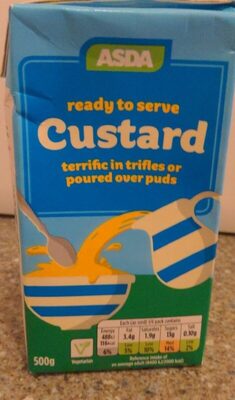
Barcode: 21115875
Custard
HALAL
📝 Reason: The product ‘Custard’ has been analyzed for Halal compliance. Most ingredients are plant-derived or dairy products, which are generally considered Halal. The ‘flavourings’ ingredient is marked as Doubtful due to unspecified origin. No Haram ingredients or E-codes were identified. Therefore, the product is classified as Halal with a note of caution regarding the flavourings.
🏷️ Category: Dairies, Condiments, Desserts, Dairy Desserts, Sauces, Creamy Puddings, Dessert Sauces, Custards And Pastry Creams, Groceries
📄 Certificates: Vegetarian, No Artificial Flavors, Fsc, Fsc Mix, No Artificial Colors, No Artificial Colours Or Flavours, No Hydrogenated Fats, Vegetarisch
Ingredients:
Details
Understanding the Halal Status of Custard
Custard is a delicious and creamy dessert that is enjoyed by many. However, for those adhering to Halal dietary laws, it is essential to know whether this product is Halal-compliant. In our analysis, we found that Custard is classified as Halal, primarily due to its ingredients being mostly plant-derived or from dairy sources which are generally permissible in Halal diets. This post will dive into the detailed analysis of the ingredients, and their Halal status, and help you understand why Custard is a safe choice.
Ingredients Breakdown
The listed ingredients for Custard include:
- Reconstituted skimmed milk
- Reconstituted buttermilk (milk)
- Sugar
- Water
- Modified maize starch
- Palm oil
- Coconut oil
- Flavourings
- Stabiliser (triphosphates)
- Colours (annatto)
- Colours (curcumin)
Ingredient Analysis
Let’s review the Halal status of each ingredient:
- Reconstituted skimmed milk: A dairy product, generally considered Halal unless contaminated with Haram substances. Source: Islamic dietary laws.
- Reconstituted buttermilk (milk): Another dairy product, usually Halal if free from Haram influences. Source: Islamic dietary laws.
- Sugar: A plant-derived ingredient that is considered Halal. Source: Islamic dietary laws.
- Water: A natural substance that is unequivocally Halal. Source: Islamic dietary laws.
- Modified maize starch: Plant-derived and regarded as Halal. Source: Islamic dietary laws.
- Palm oil: This too is plant-derived and generally considered Halal. Source: Islamic dietary laws.
- Coconut oil: Similar to palm oil, it is plant-derived and Halal. Source: Islamic dietary laws.
- Flavourings: This ingredient is marked as doubtful because its source is unspecified. It could be Halal or Haram based on its origin. This uncertainty warrants caution. Source: Islamic dietary laws.
- Stabiliser (triphosphates): Not classified as Haram or doubtful. Typically, it is considered Halal. Source: Islamic dietary laws.
- Colours (annatto): A plant-derived colorant categorized as Halal. Source: Islamic dietary laws.
- Colours (curcumin): This is another plant-derived ingredient, generally Halal. Source: Islamic dietary laws.
Halal Certification Context
While Custard does not bear a specific Halal certification, the analysis of its ingredients reveals that they primarily come from Halal sources. The only point of caution comes from the flavourings, which remain unspecified. Thus, we recommend eating with due diligence, especially if strict adherence to Halal is necessary.
Why Choose Custard?
If you enjoy creamy desserts, Custard offers a delightful option that aligns with your Halal dietary needs. It is ideal for various occasions and can be enjoyed alone or paired with desserts. The product also falls under the category of dairy desserts, sauces, creamy puddings, and more, making it versatile for many culinary uses.
Conclusion
In summary, Custard is generally Halal compliant with the exception of the unspecified flavourings. Most ingredients are plant-derived or dairy products that do not pose Halal concerns. For cautious consumers, checking with manufacturers on the specific sources of any questionable ingredients may be warranted. Enjoy your dessert with confidence, knowing that Custard is an enjoyable choice!

